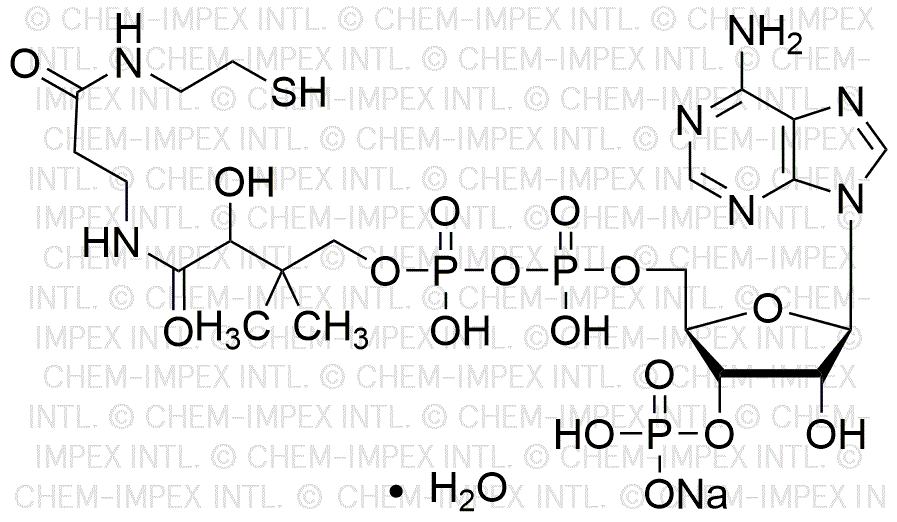Coenzyme A sodium salt hydrate is widely utilized in research focused on:
- Metabolic Studies: This compound plays a crucial role in the synthesis and metabolism of fatty acids and carbohydrates, making it essential for researchers studying metabolic pathways and energy production in cells.
- Pharmaceutical Development: It is often used in drug formulation and development, particularly in the creation of medications targeting metabolic disorders, providing a foundation for innovative therapeutic solutions.
- Biochemical Assays: The compound is a key reagent in various biochemical assays, helping scientists measure enzyme activity and understand biochemical reactions, which is vital for advancing biochemistry and molecular biology.
- Cell Culture Applications: In cell culture, it supports the growth and maintenance of cells, particularly in studies involving cancer research and regenerative medicine, enhancing the viability and functionality of cultured cells.
- Food and Nutrition Research: It is also applied in studies related to nutrition and food science, where it helps in understanding the roles of vitamins and coenzymes in human health, thus contributing to better dietary recommendations.
General Information
Properties
Safety and Regulations
Applications
Coenzyme A sodium salt hydrate is widely utilized in research focused on:
- Metabolic Studies: This compound plays a crucial role in the synthesis and metabolism of fatty acids and carbohydrates, making it essential for researchers studying metabolic pathways and energy production in cells.
- Pharmaceutical Development: It is often used in drug formulation and development, particularly in the creation of medications targeting metabolic disorders, providing a foundation for innovative therapeutic solutions.
- Biochemical Assays: The compound is a key reagent in various biochemical assays, helping scientists measure enzyme activity and understand biochemical reactions, which is vital for advancing biochemistry and molecular biology.
- Cell Culture Applications: In cell culture, it supports the growth and maintenance of cells, particularly in studies involving cancer research and regenerative medicine, enhancing the viability and functionality of cultured cells.
- Food and Nutrition Research: It is also applied in studies related to nutrition and food science, where it helps in understanding the roles of vitamins and coenzymes in human health, thus contributing to better dietary recommendations.
Documents
Safety Data Sheets (SDS)
The SDS provides comprehensive safety information on handling, storage, and disposal of the product.
Product Specification (PS)
The PS provides a comprehensive breakdown of the product’s properties, including chemical composition, physical state, purity, and storage requirements. It also details acceptable quality ranges and the product's intended applications.
Certificates of Analysis (COA)
Search for Certificates of Analysis (COA) by entering the products Lot Number. Lot and Batch Numbers can be found on a product’s label following the words ‘Lot’ or ‘Batch’.
*Catalog Number
*Lot Number
Certificates Of Origin (COO)
This COO confirms the country where the product was manufactured, and also details the materials and components used in it and whether it is derived from natural, synthetic, or other specific sources. This certificate may be required for customs, trade, and regulatory compliance.
*Catalog Number
*Lot Number
Safety Data Sheets (SDS)
The SDS provides comprehensive safety information on handling, storage, and disposal of the product.
DownloadProduct Specification (PS)
The PS provides a comprehensive breakdown of the product’s properties, including chemical composition, physical state, purity, and storage requirements. It also details acceptable quality ranges and the product's intended applications.
DownloadCertificates of Analysis (COA)
Search for Certificates of Analysis (COA) by entering the products Lot Number. Lot and Batch Numbers can be found on a product’s label following the words ‘Lot’ or ‘Batch’.
*Catalog Number
*Lot Number
Certificates Of Origin (COO)
This COO confirms the country where the product was manufactured, and also details the materials and components used in it and whether it is derived from natural, synthetic, or other specific sources. This certificate may be required for customs, trade, and regulatory compliance.


